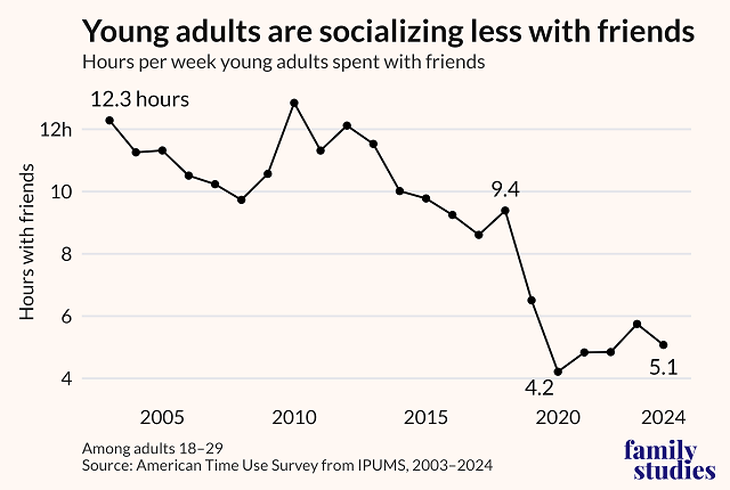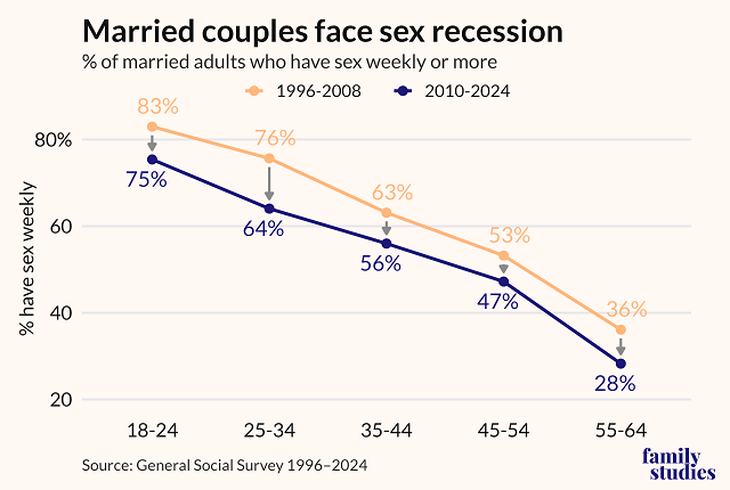A study conducted by the Institute for Family Studies (IFS) warned about a new rising crisis in the United States: the sexual recession. According to the report, in 1990, 55% of adults between 18 and 64 reported having sex weeklyaccording to the Social General Survey (GSS) and by 2024 Only 37% declared to have sex with that frequency.
First, the psychologist Jean Twenge It warns that these numbers respond to a generational trend since young people have less sex than before. In principle, this is because there are fewer stable links, especially less marriages, added to a lower sexual frequency even within couples.
1-Newsex-Recession-Trend-W640
Sexual recession in the United States
Why do young people have less sex than before
Between 2014 and 2024, the proportion of young people aged 18 to 29 who lived as a couple – caught or not – fell 10 points, of the 42% to 32%. As adults with a partner are the ones who have the most sex, and more and more young are alone, The regular frequency continues to fall.
There was also a marked growth in asexuality (“no sex in the last year”). The break came after 2010: before, it remained stable around 15% but Between 2010 and 2024, the proportion doubled, from 12% to 24%.
This could respond to the pattern explained by Jonathan Haidt in his book The Anxious Generation (the anxious generation). There he points out that between 2010 and 2015 the “great reconfiguration” occurred: the expansion of smartphones caused adolescence to become more and more digital, reducing face -to -face socialization and shooting pathologies such as anxiety, depression and self -destructive behaviors.
Thus, a generation of hermits emerged. The fall in social time began to be a phenomenon even before the pandemic: between 2010 and 2019, the weekly hours with friends dropped from 12.8 to 6.5. With the Covid they went down to 4.2, and although there was a rebound, In 2024 the average barely reached 5.1 hours.
3-Young-Lults-Socializing-W640

Young people are socializing less with their friends.
It is not surprising that, in parallel, asexuality will increase. More time on smartphones, social networks and pornography meant less social skills and less opportunities for romantic interaction. Some studies even suggest that video games contribute to Withdrawal of young men from the labor marketreducing its appeal as a couple. Recent work found that the fall in romantic links and the lower alcohol consumption are the main causes of the fall in youth sexual activity, followed by the decrease in income and the greatest use of video games.
In short: young people spend less time dating, having appointments and marrying, with the obvious consequences for their sexual life. In fact, The lack of marriage is the main explanation of why young people suffer more strongly the sexual recession. Married have much more intimacy: 46% of married adults from 18 to 64 have weekly sex, compared to 34% of single.
How the digital revolution affected the already established couples
But the phenomenon is not limited to the youngest. It also affects married. Between 1996 and 2008, 59% of marriages from 18 to 64 years reported weekly sex. Between 2010 and 2024, that percentage fell to 49%.
This can also be a consequence of the digital revolution, which not only impacts young couples. An IFS study in 2023 showed that the married ones had less sex when one of the spouses replaced time as a couple with the use of screens. In addition, the phenomenon of “procrastination at bedtime” is increasingly common: using screens for two hours in the three prior to sleep, which reduces intimacy.
5-Newmaried-Cuples-Recession-W640

How “sexual recession” affects married couples.
Source: Ambito
I am an author and journalist who has worked in the entertainment industry for over a decade. I currently work as a news editor at a major news website, and my focus is on covering the latest trends in entertainment. I also write occasional pieces for other outlets, and have authored two books about the entertainment industry.




